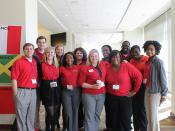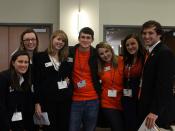Abstract: A majority of students in the classrooms of colleges and universities today, are a product of a generation of latch key kids in which daycare, babysitters, television, and computers serve as surrogate parents. With the proliferation of technology, the internet, beepers and cell phones have become social lifelines for this generation. They are technology savvy, independent and resourceful. Conditioned to expect immediate gratification, these youth have shorter attention spans and also a low threshold for boredom. It can be quite a challenge for educators to keep these young people engaged in the classroom. This paper presents an innovative teaching/ learning strategy used in a nursing school in Florida that accommodates the unique characteristics of these learners.
Key Words: Self-Expression, Generation Y, Learning Styles
**********
Today, a majority of students in the classrooms of colleges and universities across the country were born after 1975. These young people, born between 1975 and 1981, are categorized as generation Xers and those born after 1981 as generation Yers or MTV generation. An unprecedented number of these young people lived in households where both parents work or in single parent households where the single parent is employed. Generation Xers and Yers belong to a generation in which daycare, babysitters, television (especially MTV--Music Television and BET--Black Entertainment Television) and peers serve as surrogate parents (Holtz, 1995). Because many of them have grown up with computers, a majority of youth in this generation are technologically literate. In fact, intrinsic to the proliferation of technology, modern tools of communication such as the internet, beepers and cell phones are social lifelines for these generations. Consequently, youth of today are more independent, resourceful and peer dependent (Whitehead, 1997). They also tend to be inventive and are self-sufficient problem solvers. They often desire support and feedback, but detest authoritative...


